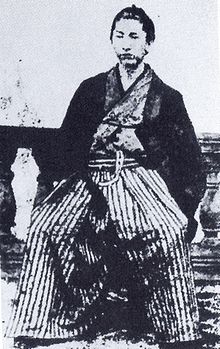Ōkōchi Masatada
- Machine translation, like DeepL or Google Translate, is a useful starting point for translations, but translators must revise errors as necessary and confirm that the translation is accurate, rather than simply copy-pasting machine-translated text into the English Wikipedia.
- Do not translate text that appears unreliable or low-quality. If possible, verify the text with references provided in the foreign-language article.
- You must provide copyright attribution in the edit summary accompanying your translation by providing an interlanguage link to the source of your translation. A model attribution edit summary is
Content in this edit is translated from the existing Japanese Wikipedia article at [[:ja:大河内正質]]; see its history for attribution. - You may also add the template
{{Translated|ja|大河内正質}}to the talk page. - For more guidance, see Wikipedia:Translation.
Ōkōchi Masatada | |
|---|---|
大河内 正質 | |
 | |
| Personal details | |
| Born | May 27, 1844 Sabae Domain, Echizen Province, Japan |
| Died | June 2, 1901(1901-06-02) (aged 57) Tokyo, Tokyo Prefecture, Japan |
Ōkōchi Masatada (Japanese: 大河内 正質, 1844–1901) was a Japanese daimyō. He was the last lord of the Ōtaki Domain.
Biography
Ōkōchi Masatada was born in 1844 as the fifth son of Manabe Akikatsu, lord of the Sabae Domain.
Boshin War service
Ōkōchi was the nominal leader of the shogunate army at the Battle of Toba–Fushimi in January of 1868, where he was defeated by the revolutionary Imperial Japanese Army. On January 29th, he retreated from his headquarters at Yodo Station.[1]
During the war, Ōkōchi reportedly ate meat from the faces of slain soldiers as an accompaniment to sake.[2]
Although Ōkōchi and Takenaka Shigekata were described by the Imperial authorities as the "ringleaders" (巨魁) of Toba-Fushimi, Ōkōchi was able to protect the Ōtaki Domain from retaliation by the new government by quickly surrendering Ōtaki Castle.[3]
After the war
Ōkōchi died in 1901. He was survived by his eldest son Ōkōchi Masatoshi.
References
- ^ "国立国会図書館デジタルコレクション『徳川慶喜公伝 巻四』". National Diet Library Digital Collection. 竜門社 Ryūmonsha. 1918. Retrieved 5 April 2024.
- ^ 牧原 Makihara, 憲夫 Norio (December 26, 2008). 文明国をめざして. Japan: 小学館 Shōgakukan. ISBN 978-4096221136.
- ^ 水谷 Mizutani, 憲二 Kenji (April 1, 2011). 戊辰戦争と「朝敵」藩: 敗者の維新史. Japan: 八木書店 Yagi Shoten. ISBN 978-4840620444.
- v
- t
- e











